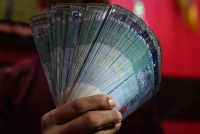Ringgit fall: Roadshow or pro-market reforms?

SHAH ALAM - Following the current fall in the value of the ringgit Prime Minister Datuk Seri Anwar Ibrahim insisted that it cannot be compared to the Asian financial crisis in 1998.
He said 26 years ago, the country not only experienced the lowest ringgit fall at RM4.885 per US dollar but also faced high inflation and unemployment rates in addition to no foreign investment.
It is different now, Anwar explained. He said it needed to be seen as a whole where the country recorded the largest investment record in history, the inflation rate continued to decrease and the unemployment rate also decreased.
For the record, the country achieved the highest investment figure in history which was RM329.5 billion last year, but why is the ringgit still weak?
This was because the cause of the fall in the ringgit was largely contributed by external factors such as interest rates in the US which were expected to remain high at 5.50 per cent.
In addition, China's economic slowdown due to the real estate market crisis forced China's central bank to cut interest rates to support economic growth.
These factors were beyond the control of the Malaysian government, therefore, the government must continue to be responsive and continue to implement economic reforms to increase credibility and reassure investors, traders and the people.
Interestingly, former Health Minister Khairy Jamaluddin recently suggested that the government hold a roadshow not only to attract investment but also to explain to the people about the situation of the ringgit's fall and the measures taken to deal with it.
Commenting on the proposal, Bank Muamalat Malaysia Bhd chief economist Dr Mohd Afzanizam Abdul Rashid said it was a good initiative but it must be inclusive.
"It should not be limited to investors or capitalists only, it should involve the people at various levels so that they understand what the government is doing.
"Any dissemination of information about economic reforms and government policies must be explained in simple language and more importantly the implementation must be consistent.
"From there, it will establish the government's credibility in managing the economy, thereby increasing investor confidence," he told Sinar.
He added that the weak ringgit value was not a reason to press the panic button because with credibility, the government was able to attract foreign direct investment (FDI) and portfolio investment that will help restore the value of the ringgit.
"Don't panic even if the ringgit is weak, the proof is that the banking system is still stable and operating as usual, such as taking deposits and giving loans.
"The fall of the ringgit also does not affect the federal government's ability to pay its debts because most of its debts are in ringgit. Next, the foreign debt is low and Malaysia does not face the problem of twin deficits.
"This means that the country has savings that exceed investment which means that the country has high liquidity to finance the country's economic growth," he said.
Wisdom
Commenting futher, he said there was still valuable insight to gain from the decreasing value of the ringgit.
"The tourism sector, for example, needs to take maximum advantage of the current decline in the ringgit to promote and attract foreign tourists to spend holidays and spend here.
"The spending of foreign tourists in the country is able to boost the movement of the ringgit thus stimulating the economy back to a more positive direction," he said.
Meanwhile, Market Education Centre (CME) chief executive officer Carmelo Ferlito said it was more important to emphasise the pro-market reform agenda than any roadshow.
"I don't think investment can go up solely with roadshows, which are mostly political parades with very little impact on the real economy.
"What is the point of a roadshow if foreign-owned businesses are taxed more than local ones, if labour laws are limited, if the government shows a constant desire to disrupt the price mechanism and control the economy?.
"What is important is for the government to promote not only FDI but also local entrepreneurship," he said.
At the same time, Ferlito was of the view that the idea that weak ringgit can favour certain industries such as tourism was misleading and too simplistic.
"Although it is true that more tourists can be attracted by the weak ringgit, what is the point of more money coming in if the real value of the money continues to decline? A weak currency will contribute to rising prices.
"Therefore, the perception of a weak ringgit giving higher rewards for the tourism industry can be a financial illusion," he said.










